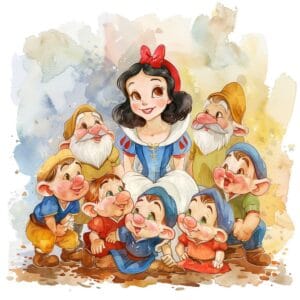It is wintertime, and the earth is covered with a layer of snow, as smooth as if it were marble cut from a mountain. The sky is high and clear, and the wind as sharp as an elfin-forged sword; the trees stand like white coral, or resemble blooming almond branches, and the air is as fresh as it is in the high Alps. The night is beautiful with streaming northern lights and countless twinkling stars.
Continue reading →Traditional fairy tales
Traditional fairy tales, these are beautiful tales that have been loved by children and their parents for hundreds of years. Perhaps the language has been dusted off a little, but Hansel always steals the gingerbread and Snow White always gets a kiss from the prince. A good ending is also traditional in fairy tales!

What the old man does is always right
I will tell you a story that was told me when I was a little boy. Every time I thought of this story, it seemed to me more and more charming; for it is with stories as it is with many people– they become better as they grow older.
Continue reading →The wind tells about Valdemar Daae and his daughters
When the wind sweeps over the grass, the blades of grass ripple like the water of a lake; and when it sweeps over the cornfield, the ears of corn curl into waves like those on a lake; this is the dance of the Wind. But listen to him tell the story; he sings it out; and how different his song among the trees of the forest is from his shriek through the cracks, crannies, and crevices of old walls.
Continue reading →A leaf from heaven
High up in the thin, clear air there flew an angel bearing a flower from the garden of heaven. As he kissed it, a tiny leaf drifted down into the muddy soil in the middle of the wood; it very soon took root there, and sprouted, and sent up shoots among the other plants.
Continue reading →The swan’s nest
Between the Baltic and the North Sea there lies an old swan’s nest, wherein swans are born and have been born that shall never die.
Continue reading →By the almshouse window
Near the grass-covered rampart which encircles Copenhagen lies a great red house. Balsams and other flowers greet us from the long rows of windows in the house, whose interior is sufficiently poverty-stricken; and poor and old are the people who inhabit it. The building is the Warton Almshouse.
Continue reading →The buckwheat
Very often, after a violent thunder-storm, a field of buckwheat appears blackened and singed, as if a flame of fir had passed over it.
Continue reading →Princess Mouseskin
Once upon a time, there was a king who had three daughters. He desired to find out which of the three loved him the most. So he called them forth, and posed the question to each: “How much do you love me?” The first said that she loved him more than the whole kingdom. The second that she loved him more than all the jewels and pearls in the world. When the third daughter declared that she loved him more than salt, he flew into a rage. Then he ordered his servant to carry the little girl into the woods and kill her.
Continue reading →The golden key
In the winter time, when deep snow lay on the ground, a poor boy was forced to go out on a sledge to fetch wood. When he had gathered it together, and packed it, he wished, as he was so frozen with cold, not to go home at once, but to light a fire and warm himself a little. So he scraped away the snow, and as he was thus clearing the ground, he found a tiny, gold key. Hereupon he thought that where the key was, the lock must be also, and dug in the ground and found an iron chest. If the key does but fit it! thought he, no doubt there are precious things in that little box. He searched, but no keyhole was there. At last he discovered one, but so small that it was hardly visible. He tried it, and the key fitted it exactly. Then he turned it once round, and now we must wait until he has quite unlocked it and opened the lid, and then we shall learn what wonderful things were lying in that box.
Continue reading →The nail
A merchant had done good business at the fair; he had sold his wares, and lined his money-bags with gold and silver. Then he wanted to travel homewards, and be in his own house before nightfall. So he packed his trunk with the money on his horse, and rode away.
At noon he rested in a town, and when he wanted to go farther the stable-boy brought out his horse and said, “A nail is wanting, sir, in the shoe of its left hind foot.” – “Let it be wanting,” answered the merchant; “the shoe will certainly stay on for the six miles I have still to go. I am in a hurry.”